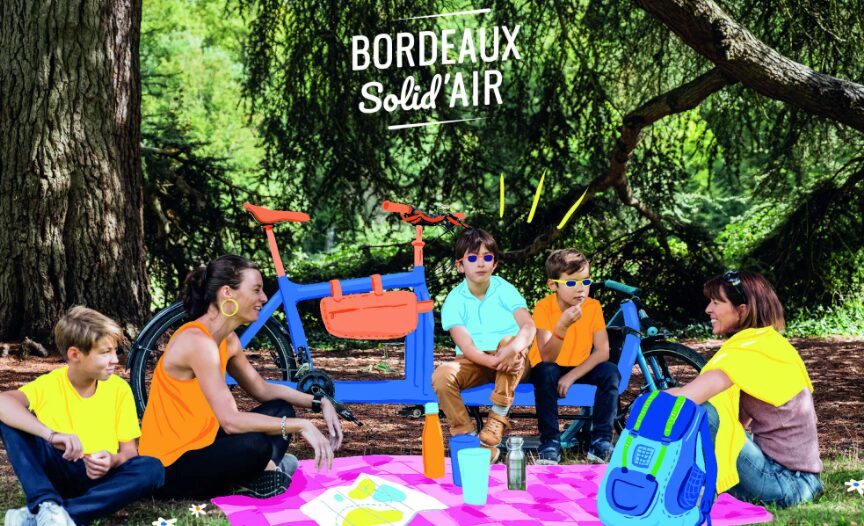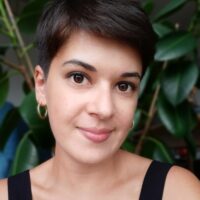IN CONVERSATION WITH JULIE BENISTY, BORDEAUX TOURISM & CONVENTIONS & KEYNOTE SPEAKER AT CITYDNA AUTUMN CONFERENCE IN VALENCIA: ‘BUILDING BLOCKS FOR DESTINATION POSITIVE’
Written in collaboration between City Destinations Alliance and Group NAO.

Photo Copyright: Gabriel Bord
IN CONVERSATION WITH JULIE BENISTY, BORDEAUX TOURISM & CONVENTIONS & KEYNOTE SPEAKER AT CITYDNA AUTUMN CONFERENCE IN VALENCIA: ‘BUILDING BLOCKS FOR DESTINATION POSITIVE’
Written in collaboration between City Destinations Alliance and Group NAO.

In the heart of Bordeaux, a transformative programme, Bordeaux Solid’AIR, has been unfolding. Based on the concept of local and solidarity tourism, Solid’AIR grants those in precarious situations the right to leisure. Dispelling the idea that tourism simply caters to visitors from distant places, Bordeaux has been providing cultural city experiences for those with limited means within their own city – a space where they often feel isolated. From hotel stays for women who experience domestic violence, or holidays for lower-income families, at its core, Solid’AIR serves as an unexpected, yet important bridge between tourism and social equality. Solid’AIR links tourism professionals, industry partners such as the Aquitaine Museum in Bordeaux, and social workers.
We sat down with Julie Benisty to hear more about how this programme evolved and what wisdom she could offer to other destinations keen to do a similar initiative.
Firstly, this is quite an unusual way to be working with tourism. How has your own definition of tourism changed?
I used to think tourism was only about welcoming people coming from other places, not about how you could be useful for your community. But tourism is not an end or a goal in itself. The goal is not to welcome more and more tourists, tourism must be a tool for something and be useful for your community. This is a question I keep in mind, and keep trying to figure out how to unfold.
Why do you believe leisure experiences are so important, also for those in precarious situations, when they may be facing far greater challenges in their lives?
I think that we all need and deserve rest. In your daily life, the struggles and challenges can be inescapable. Bordeaux Solid’AIR is about creating moments outside of your daily life, and to feel as though you belong in the city you are living in.
What was your starting point for Bordeaux Solid’AIR? Where would you advise other destinations to start?
No matter what the subject is, whether it’s accessibility or inclusion, the thing that you must do, is find an appropriate facilitator. Because this is not your job. You don’t know the needs or how to access the people you are trying to reach. This is not about offering an evening for 150 ‘disadvantaged’ people and letting everyone know you are a nice DMO – that would be social washing. You have to find a proper facilitator in your community that you can work with, who can mediate between your DMO and the people you’re trying to reach, and it has to be included in the global framework of their inclusion programme or their accessibility programme. This may be a local association for example, and in our case, we partnered with social workers.
But remember, you don’t need to start working with 60 associations right away. Start by finding one who has some relevance to tourism, so you share a similar vocabulary and understanding. Our first partner was an association which financed people to go on holiday, so it was very connected to our usual activities. We did this for three years before opening the programme to work more with social workers – we wanted to make sure Solid’AIR had a solid foundation.
How did your initial collaboration with social workers unfold in the Bordeaux Solid’AIR programme?
It wasn’t easy at first! In part because social workers have such pressing and important things to think about when they are trying to help people, like: Do they have a safe home? Do they have a job? Do they have money to eat? And often there is a very small team dedicated to leisure activities. When we came to them as a tourist office, they kept asking me in the first meeting why I was there and told me I was knocking at the wrong door! To them, tourism wasn’t something you do for people who actually live in Bordeaux.
So, if the DMO is not a facilitator, what is the key attribute of the DMO in the context of social tourism?
Adaptability. For example, a hotel approached me as they wanted to host an evening for women survivors of domestic violence. We weren’t working in this area, as we were more concerned with working with low-income associations. But we wanted to adapt and make this work. We found a local association, and whilst they appreciated the idea, they said it wasn’t what they needed. Instead, this local association really needed to secure one night a month with a hotel, as when a woman is in danger, they can send her there. The hotel that approached us ended up offering this. With a programme like Solid’AIR, you have to continually adapt to make sense for the people you are trying to reach.
What would you say to someone who wanted to start a programme like Bordeaux Solid’AIR in their own destination?
You need to provide a good case as to why your DMO should start this programme. There is a lot of survey data available across countries concerning access to leisure for people in precarious situations, and you can use this data to motivate your efforts in contributing to a solution. It also helped that we had workshops with residents and associations. This wasn’t an idea that came to my mind one morning – our stakeholders asked us to do something about this.
Secondly, it does not take a huge budget. In the first six months of the programme, but make sure you have a dedicated person to follow up. It’s not so much about having a large amount of money, but rather the time it takes to meet with partners. At the same time, word of mouth really makes this programme work by itself. Destinations need to know this is an affordable initiative.
And finally, Julie, we all came together for the City Destinations Alliance Conference in Valencia to explore and unfold the idea of ‘Destination Positive’. Do you believe we can get there?
I have to, otherwise I’ll just be a zombie all day long. It’s not about just looking at the bright side of things, it’s about motivating people to start a movement. When you look at the word ‘emotion’, it comes from a Latin word, which means movement. So, you have to create emotions to make people move. I think tourism and the events industry keep finding ways to talk about sustainability that are full of contradictions. ‘Destination Positive’ isn’t about clinging onto a business-as-usual approach to ‘save the industry’; it’s about shattering those beliefs. It acts on critically-informed solutions which genuinely drive a better future.